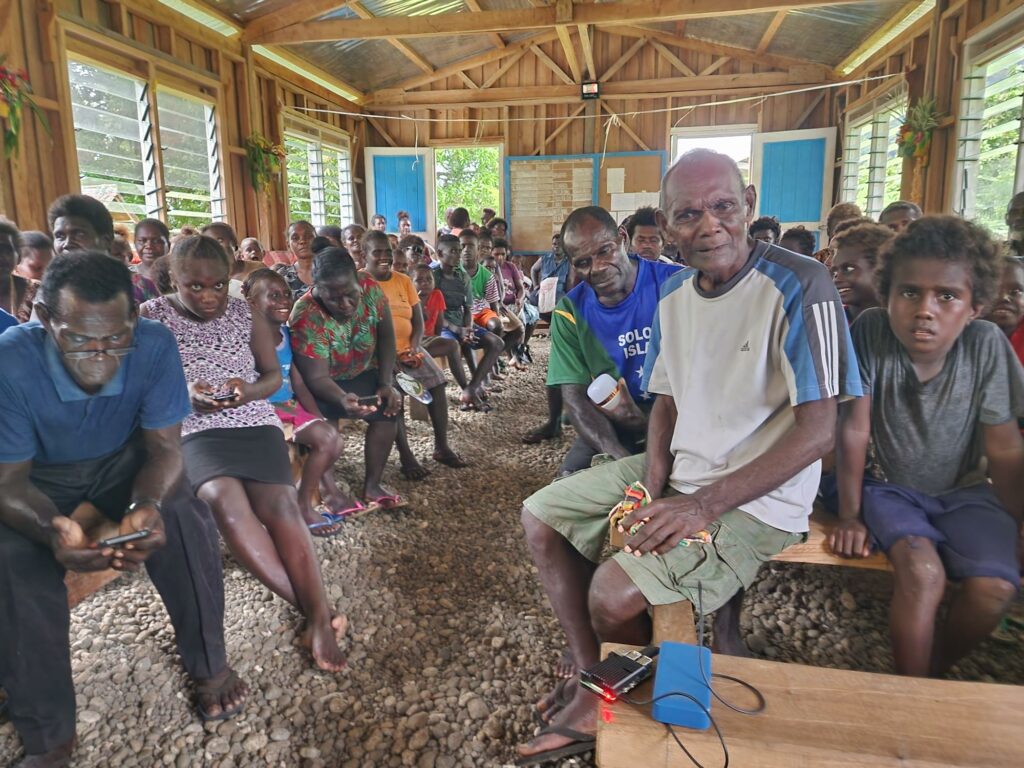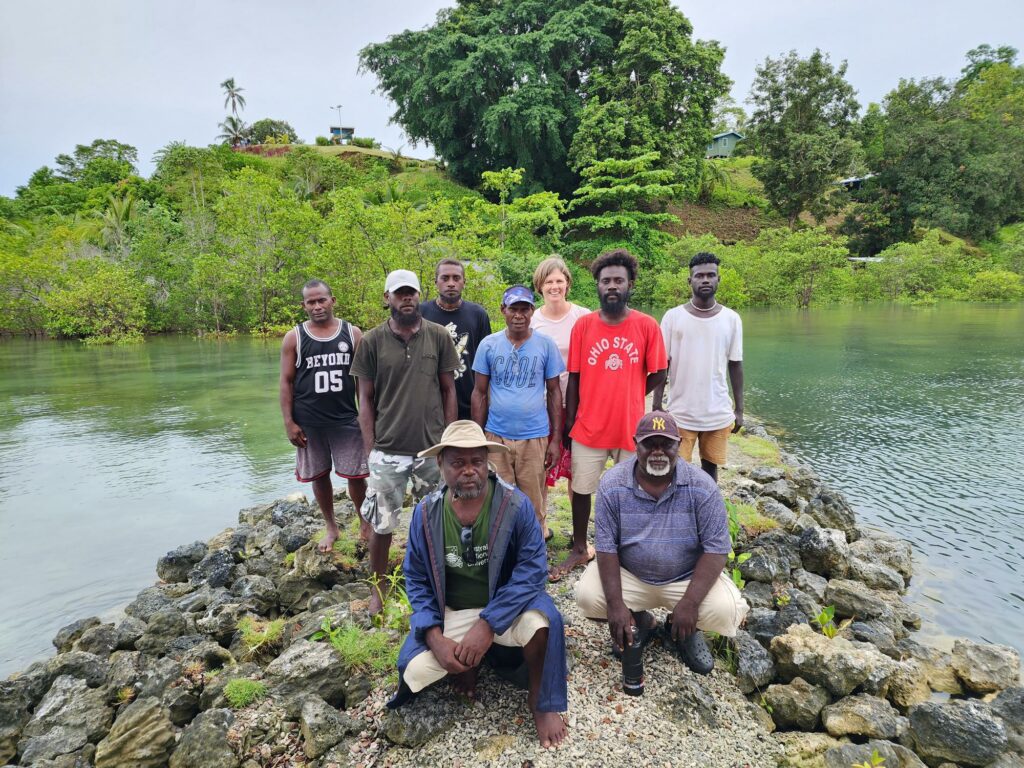By guest blogger Debra McDougall
I thought I’d write a short update to Nick’s post on 21 January 2024 about using the Raspberry Pi to return legacy recordings to people in Ranongga, Solomon Islands.
These recordings were digitised in 2019-2020 with the support of an ELDP Legacy Materials Grant (0609), a project led by myself and Dr Alpheaus Graham Zobule, the founder and director of the Kulu Language Institute of Ranongga, with much assistance from Nick Thieberger and the PARADISEC team. There are three audio collections: my own cassette recordings (DLM1998), the recordings of local researcher Kenneth Roga who recorded stories in the mid-1980s (ROHP1), and recordings from visitor Laurence Stubbs in the early 1990s (ROHP2). The latter were part of a Ranongga Oral History Project led by the now-defunct Western Province Culture office with the assistance of Canadian volunteers. The digitised files are held in ELAR and PARADISEC.

Lale villagers listening to stories from the Ranongga Oral History Project
The Kulu Language Institute is a remarkable organization that has grown in Ranongga over a quarter of a century. Kulu stands for Kubokota (also called Ganoqa, (ISO code: ghn) ) and Luqa, the two languages spoken on Ranongga Island. The language work began when Zobule was translating the New Testament into Luqa and began developing materials to help people read in their first language (for a generation, literacy instruction had been only in English, a language rarely spoken in Ranongga). Generations of passionate teachers have used texts written by Zobule to teach young people and adults to read, write, and analyse the grammar of their own language.
Starting on Sat 20 January, the Kulu Language Institute team (Dr Zobule, Principal Reuben Pae, Deputy Principal Nathan Manoah, Finance Manager Reginal Jiru, Head translator Allan Buka, and pioneer teacher John Tengana) embarked on a 7 day tour of Ranongga with three goals: open new local language schools for children in villages around the island, spread the news about other activities at the Kulu Language Institute, and share the digitised materials.
We started in the Luqa village of Lale, which is where I realised that I was missing some files. Although the area is not within reach of mobile telephone towers, the Kulu team was travelling with a Starlink satellite connection, acquired through Bible translation partners overseas, so I was able to contact Nick, who (as is his habit) responded within about 10 minutes despite the fact that it was a Sunday. I was able to load the missing data on a separate thumb drive.
Photo: The Kulu crew.
Front, kneeling. Director Alpheaus G Zobule, Principal Reuben Pae
Standing, left to right. Maezana Vavira (boat skipper), Deputy Principal Nathan Manoah, Chief Luqa translator Allan Buka, Pioneer teacher John Tengana, Debra McDougall, Finance manager Reginal Jiru, Solomon Sagopio (boat crew)

I also reviewed some of the existing files with the Kulu team, focusing particularly on some recordings that contain information about genealogy and land that might re-ignite recently settled disputes. (Since the time recordings were made, Ranongga has experienced a few rounds of environmentally and socially destructive logging operations). I also updated notes on where descendants of the speakers were living now so we could plan our path of travel.
The first live trial of the Raspberry Pi was on Sunday evening in the village church. We played one of the oldest recordings for the 100 or so people gathered. Two dozen or more people had mobile phones to access the recordings and it turned out to be more difficult to manage than I had hoped. First, because there is little to no mobile connectivity in this area, few people are very accustomed to using their phones for accessing internet access. So even basic functions like turning on the wireless required my assistance. Second, there may have been too many phones trying to access the Raspberry Pi at the same time. Even when a phone showed a connection, the page didn’t load. Third, some of the cheapest touch screen phones from various Chinese manufacturers seemed to connect and show the PARADISEC offline index page heading, but the page didn’t load. Finally, navigating through the collections is difficult. There are 3 collections with more than 100 items. Some of the descriptions for the items are so long that they stretch past the screen of a phone, making navigation difficult even for someone (me) who knows the collection intimately. Name tags are useful, but they seem to appear in order of appearance in the collection, not alphabetical order.
Notwithstanding the challenges, I eventually managed to share all of the recordings from Lale by working with one person at a time and, where necessary, using the “share” function on my own Android phone rather than the Raspberry Pi (this seemed to be the only option for the cheap Chinese phones). In the next gatherings, we organised that I would sit with just a few people at a time so that I could assist them one at a time using both Raspberry Pi and my mobile phone.
In those seven days, we held meetings in 13 villages: Lale, Keara, Saevuke, Kudu, Sabala, Keqolo, Koriovuku, Buri, Kolomali, Patu, Pienuna, Obobulu, and Judeah, a small hamlet between Suava and Paqe, where Deputy Principal Nathan Manoah has opened a language school. I returned nearly all of the non-restricted recordings to more than 150 people.
In Australia and other places, we are prone to think that anything on the internet is actually accessible. Our trip highlighted the massive digital divide—not only between countries like Australia and Solomon Islands but also between different places within Solomon Islands. In many of the bigger villages on the leeward side of the island, which have excellent accessibility to the provincial town, reasonable connectivity, and income generation opportunities, young people were internet savvy. On the weather coast of the island, not only is digital communication difficult—all communication is challenging! We were travelling at the time of the west wind, which meant that our skipper (Maezana Vavira) and (crew) Solomon Sagopio had to navigate big breakers coming from behind as we passed through the narrow passages in coral rock that lead to village landing places. To get to villages like Kudu, Keqolo, and Sabala located hundreds of meters above the ocean, we followed paths up cliffs so steep I had to use hands and feet to pull myself up.
I have wanted to return these recordings for many years, and I am so grateful for the support of ELDP and PARADISEC, particularly Nick (!) for making it possible, and for the passionate work of the Kulu Language Institute to support language development on Ranognga.
On one morning, a woman came down from Sabala—an hour walk inland—to meet us on the shore before we took off for the next visit. She said she had listened to her father’s speech last night, and it was as though he was in the room with her. “You’ve made me cry,” she said, but they were good tears because she felt his presence.
 Follow
Follow
Thank you for doing great work in & around our island.